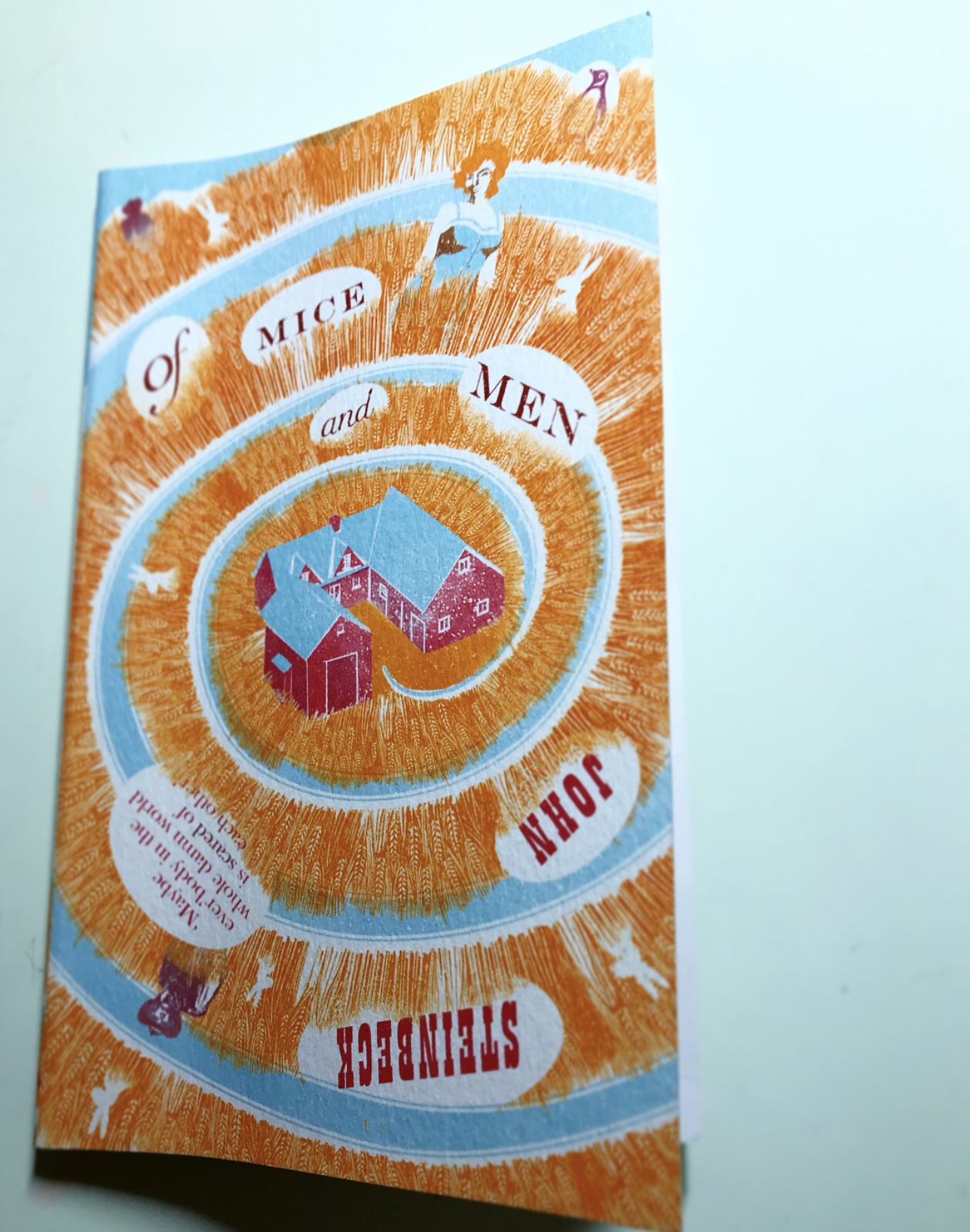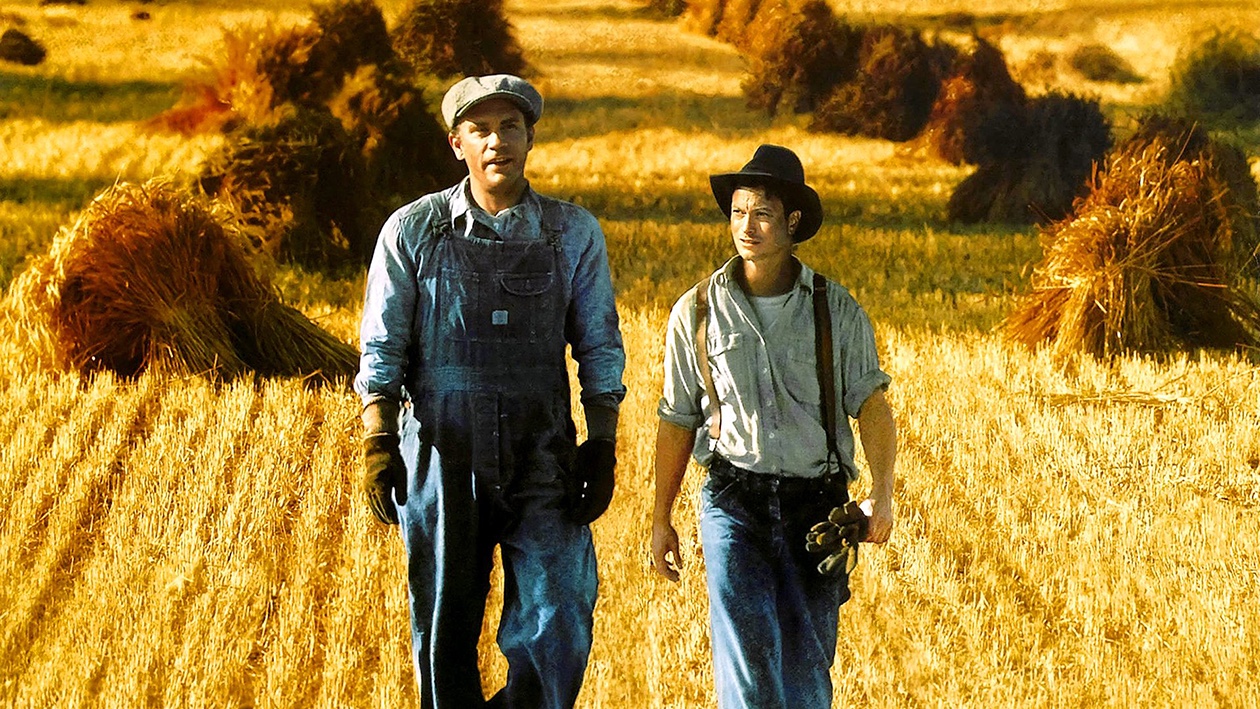This book was so enthralling and compelling that I’ve read it in just one night!
Unfortunately, that night I wanted to relax and unwind a little bit from the stressful exam session I had just finished and I didn’t know this wouldn’t be an easy reading, in the way it has made me cry and think out loud a lot.
I had already read another book (‘The Grapes of Wrath’, 1939) of the same author, John Steinbeck, last year and I liked so much his style and themes that I decided to buy another of his masterpieces, that is, ‘Of Mice and Men’ (1937).
Since the previous book I had read was mainly based on social and economic themes such as the Great Depression and the migration towards the West, I thought from the first pages of ‘Of Mice and Men’ that it would be similar to the other one.
Indeed, this book apparently tells of two guys, George and Lennie, who are looking for job opportunities as ranch workers in Soledad, California during the Great Depression. Until now, the story looks pretty much like ‘The Grapes of Wrath’ but in a few pages I understood it goes much beyond economic crisis and poverty but it’s a story of love, passion, brotherhood, hatred, loneliness and disillusion.

The protagonists of this story are George and Lennie. They have a very special bond since George is Lennie’s guardian and bestfriend and dreams of having his own homestead and economic independence, whereas Lennie is a calm, innocent and childlike guy who is physically strong and big but mentally disabled. For this reason, George has to carefully take care of him and to continously repeat Lennie what he has or not to do.
Lennie is a big-hearted guy but his disease doesn’t allow him to distinguish good from evil and to be aware of its physical strength and the potential power and threat of it. It would be Lennie’s improper usage of his strength that, although unintentionally, would put him trouble and finally lead him to death.
The core theme of this book is loneliness. Every character in the story is somehow lonely: George’s companionship with Lennie is a result of loneliness of both sides; Crooks, a black stable-hand, is avoided and isolated from the other ranch workers, who mistreat him because of the color of his skin and as a consequence he creates further barriers by closing in himself and ranting about his solitude; Candy is an old worker afraid of his age and the imminent loss of his job and the death of his dog, actually his only friend; Curley, the boss’ son, is an handy, violent and jealous guy who, incapable of loving anyone, is always looking for fights and rows; and even the pretty and provoking Curley’s wife hides under her confidence and sex-appeal a desperate demand for company and attention, which her companion is not able to give her.
Steinbeck wants to warn us about the importance of trying to understand each other instead of fighting against each other (‘Maybe ever’body in the whole damn world is scared of each other’, he would make one of his characters say) and the human desperate need for companionship and friendship (‘A guy needs somebody to be near him’, he would make say to one of the most lonely characters, Crooks).
It’s painful and heart-breaking seeing how all the characters that have a dream in this story will see their hopes vanish and be destroyed whether by the fate or external circumstances. They are so powerless about their lives and their future, in the end what George and Lennie ( who will later join Candy and Crooks) are asking is not too much: ‘We gonna get a little place. We’ll have a cow and we’ll have maybe a pig an’ chickens an’ down the flat we’ll have a little pieace alfalfa for the rabbits, and you can tend the rabbits.’ – this is George’s foresight and the story he will tell and repeat till the end to Lennie).
Indeed the title of this book, ‘Of Mice and Men’, is taken from Scottish poem ‘To a Mouse’, verses of grief, disillusion and resignation which quote:
‘But little Mouse, you are not alone,
In proving foresight may be vain:
The best laid schemes of mice and men
Go often awry,
And leave us nothing but grief and pain,
For promised joy!’
I didn’t execpt the ending to be so cruel and harsh but as many have already said this is novel is ‘human, uninhibited, bawdy and compassionate’ (The Daily Telegraph) as life sometimes really is; this a desperate cry of solitude and a complaint about injustice but in the end, it is nothing but a message of love, true bonds and friendship, the need of understanding each other and the courage of making hard choices and sometimes uncanny ones for the sake of who we care for and in the name of love.
Lennie has too much love to deliver he isn’t able to handle it and he suffers from his waywardness and disability, he cannot control his feelings and cannot see the consequences of his actions and the ending of this story has made me feel so angry and frustrated because of this.
But in the end I realized that what this story is really about is love and I’m always going to keep in my heart one of the final scenes of the book which I want to share with you and leave to you all:
‘ “Well, I can go away,”, said Lennie. “I’ll go right off in the hills an’ find a cave if you don’ want me.”
George shook himself again. “No,” he said. “I want you to stay with me here.”
Lennie said craftily – “Tell me like you done before.”
“Tell you what?”
” ‘Bout the other guys an’ about us.”
George said, ” Guys like us got no fambly. They make a little stake an’ then they blow it in. They ain’t got nobody in the worl’ that gives a hoot in hell about ‘em ―”
“But not us,” Lennie cried happily. “Tell about us now.”
George was quiet for a moment. “But not us,” he said.
” Because ―”
“Because I got you an’ ―”
“An’ I got you. We got each other, that’s what, that gives a hoot in hell about us,” Lennie cried in triumph.” ‘
(Of Mice and Men, p. 117-8, John Steinbeck).

I highly recommend you this short novel that consists of everything life is: a continuous quest for love that in the end is the only thing can save us against all odds.
